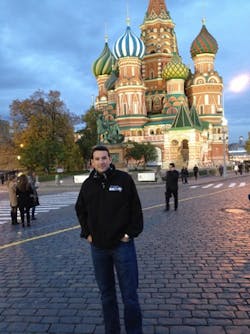Have you seen Zero Dark 30 yet? For the uninitiated, it’s the story of how U.S. Special Forces finally found the man on America’s most-wanted list: Osama bin Laden. The film’s title relates to the time of the mission—half past midnight. That’s a time superstitious civilians call the witching hour. But to someone in the military, this is a time when goblins get defeated.
After seeing that movie this weekend I couldn’t resist making the connection between that kind of mission and what Patrick Wedig did while in the Air Force. He defeated his share of goblins and gremlins between 1993 and ’97 during his stint on the graveyard shift as a jet engine mechanic stationed at McChord Air Force Base, Tacoma, Wash. He and his buddies may have seemed to be fixing aircraft in the wee small hours, but they were actually completing their own internal transformations to adulthood. In Wedig’s case it also prepared him for a career in logistics.
“Graveyard shifts are much different from day shifts because your support level is much less and most times there aren’t extra hands so you have to do things outside your job field,” he told me.
I got the chance to talk to Wedig while interviewing several military veterans who ended up in supply chain management. Specifically, Wedig is now business support manager for Ikea distribution services North America. That title doesn’t necessarily scream “supply chain manager,” but then he pretty much created his own job description at Ikea. Neither he nor his employer thinks it’s a good idea to be too narrowly defined. As Ikea’s human resources people say on the company’s website: “Our way of working is less structured than that of many other organizations. … Don’t ask others what you should be doing, but ask yourself and then get on with it!”
Upon entering the service the 18-year-old Wedig couldn’t have told you what logistics was, but by the time he came out, the graveyard shift he was on gave him a new life.
“Working on grave shifts you learn to work with different people and you just start taking care of things and seeing things in a different way through problem solving,” he said. “You start asking questions about why this happened and how—even things outside your field—it’s no different than what I do today. Why are we not efficient doing something here but we are over there? Working in the military created this team environment, which has contributed to my success as a leader. Plus, working on a graveyard shift, there were about seven of us doing the work of 20 on day shift. You have to rely on your team to get things done.”
For Wedig, it was an opportunity to problem-solve. Questions like “My warehouse is too small, how can I handle these goods in a more efficient way?” became a standard exercise. Luckily, Ikea hired other veterans with the same mindset and that graveyard shift mentality kicked in.
Wetig went from part-time warehouse worker to a full time co-worker quickly and within a year and a half became responsible for the warehouse. Six months later he was both warehouse manager and project leader assistant for store expansion in Seattle. In 2003 he became logistics manager, responsible for all inbound and outbound warehousing. Over the next four years he created new working routines in the warehouse. He made similar improvements in Ikea’s global locations, including the Netherlands, Finland and Norway, as well as Spain, the U.K and Scotland.
Things moved even quicker after that. By 2005 he was ready to take on a $10 million project to prepare Ikea stores for the growth they saw coming. In 2006 he was named project manager for building a DC in Tacoma, Wash.; he then became manager of that DC. By 2010 he was determining the key performance indicators for North America.
Today, as operations manager for North America, he owns warehousing logistics—including all the KPIs for those operations. His people work with the suppliers and manage everything coming in and leaving the buildings. He also has a group that works with the retailers and manages all the flows of information going through IT. Any system upgrades are his call as well.
Pretty lively doings for a kid who got a new life during the witching hours of the graveyard shift.





